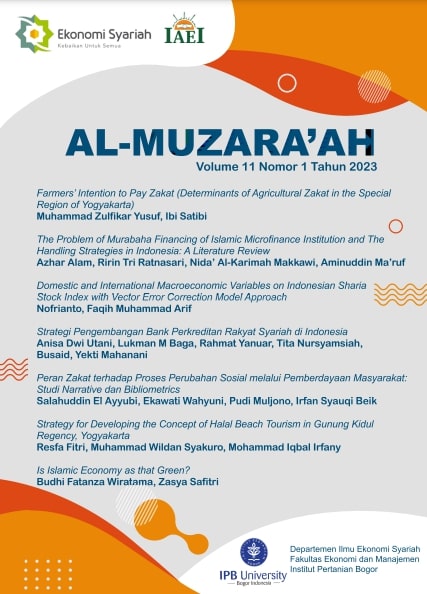Is Islamic Economy as that Green?
Main Article Content
Abstract
Economic growth is widely associated with degradation of environmental quality. Green economy is a term that later emerged to save the environment. In Islamic point of view, the environment and the economy are two things that must support each other. This study discusses Islamic economics that should be associated with sustainability, as in line with the teachings of Islam to coexist with the environment. The method used are correlation analysis and panel data regression to find out the association between Islamic economics and green growth in major Islamic economic countries. The results show that the Global Islamic Economy Indicator (GIEI) is positively correlated to the Green Growth Index (GGI). Based on the panel data regression model, Muslim Modest Fashion sector significantly has a positive effect on GGI. Unfortunately, in general, the GGI achievements of the OIC countries are still very lacking compared to non-OIC countries. It is the government's duty to start implementing environmentally oriented policies in all sectors of the Islamic economy inclusively.
Article Details
Section
Author(s) who published in this journal agree to following terms:
- Authors understand and agree that copyright of manuscripts published are held by Al-Muzara'ah. The statement to release the copyright to Al-Muzara'ah is stated in Copyright Transfer Agreement (CTA) form.
- Copyright encompass exclusive rights to reproduce, to distribute, and to sell any part of the journal articles in all form and media.
This work is licensed under a Creative Commons Attribution-ShareAlike 4.0 International License (CC BY-SA) where Authors and Readers can copy and redistribute the material in any medium or format, as well as remix, transform, and build upon the material for any purpose, but they must give appropriate credit (cite to the article or content), provide a link to the license, and indicate if changes were made. If you remix, transform, or build upon the material, you must distribute your contributions under the same license as the original.
References
Abumoghli, I. & Goncalves, A. (2020). Environmental challenges in the MENA region. Faith for Earth Updates.
Akou, H. M. (2007). Building a new “world fashion”: Islamic dress in the twenty-first century. Fashion Theory, 11(4), 403-421.
Alfred, J. O. (2021, June). An assessment of determinant factors for a sustainable green economy in Nigeria. In IOP Conference Series: Earth and Environmental Science (Vol. 793, No. 1, p. 012031). IOP Publishing.
Allen, C. & Clouth, S. (2012). A guidebook to the Green Economy: Issue 1: Green Economy, Green Growth, and Low-Carbon Development – history, definitions and a guide to recent publications. New York (USA), UN Division for Sustainable Development.
Baltagi, B. H. (2005). Econometric Analysis of Panel Data, Third Edition. Chichester (UK), John Wiley & Sons.
DinarStandard. (2022). State of the Global Islamic Economy Report 2022 - Unlocking Opportunity. New York (USA), DinardStandard.
Febriana, S., Diartho, H. C. & Istiyani, N. (2019). Hubungan pembangunan ekonomi terhadap kualitas lingkungan hidup di Provinsi Jawa Timur. Jurnal Dinamika Ekonomi Pembangunan, 2(2), 58-70.
GGGI. (2020). GGGI Technical Report No. 16: Green Growth Index 2020 - Measuring Performance in Achieving SDG Targets. Seoul (KR), Global Green Growth Institute.
Hsiao, C. (1992). Panel Analysis for Metric Data. Papers 9213, Southern California - Department of Economics.
Khan, S. A. R., Yu, Z., Sharif, A., & Golpîra, H. (2020). Determinants of economic growth and environmental sustainability in South Asian Association for Regional Cooperation: evidence from panel ARDL. Environmental Science and Pollution Research, 27, 45675-45687.
Lee, J. W. & Kwag, M. (2013). Green growth and sustainability: the role of tourism, travel and hospitality service industry in Korea. Journal of Distribution Science, 11(7), 15-22.
Murtadha, M. (2018). Islam ramah lingkungan. Jurnal Ilmiah Islam Futura, 6(2), 61-69.
Nathaniel, S., Anyanwu, O. & Shah, M. (2020). Renewable energy, urbanization, and ecological footprint in the Middle East and North Africa region. Environmental Science and Pollution Research, 27, 14601-14613.
Odugbesan, J., Aghazadeh, S., Rjoub, H., Dantas, R., Correia, A., Rita, J., & Mata, M. (2021). Modeling the determinants of sustainable green growth in the menat region: using the DCCE-MG approach. Applied Ecology and Environmental Research, 19(6), 4881-4901.
Pew Forum on Religion & Public Life. (2009). Mapping the Global Muslim Population. Washington DC (US). Pew Research Center.
Pryor, F. L. (1985). The Islamic economic system. Journal of Comparative Economics, 9(2), 197-223.
Razzaq, A., Ansari, N. Y., Razzaq, Z., & Awan, H. M. (2018). The impact of fashion involvement and pro-environmental attitude on sustainable clothing consumption: the moderating role of Islamic religiosity. Sage Open, 8(2).
Rusydiana, A. S. & Bahri, M. S. (2022). Green economy and some relevancies from Islamic finance perspective. Journal of Islamic Economic Literatures, 3(1).
Sarkawi, A. A., Abdullah, A. & Dali, N. M. (2016). The concept of sustainability from the Islamic perspectives. International Journal of Business, Economics and Law, 9(5), 112-116.
Suhada, B. & Setyawan, D. (2016). Narasi Islam dan green economics dalam pemanfaatan sumber daya alam. Kontekstualita: Jurnal Penelitian Sosial Keagamaan, 31(1), 21-36.
Sulich, A. (2020). The green economy development factors. Vision, 6861-6869.
Tawiah, V., Zakari, A. & Adedoyin, F. F. (2021). Determinants of green growth in developed and developing countries. Environmental Science and Pollution Research, 28, 39227-39242.
Thian, A. (2021). Ekonomi Syariah, edited by Mayasari, L. Yogyakarta (ID), ANDI (IKAPI).
[UNEP] United Nations Environment Programme. (2011). Towards a Green Economy: Pathways to Sustainable Development and Poverty Eradication - A Synthesis for Policy Maker [online]. [accessed 2022 June 25]. Retrieved from: https://sustainabledevelopment.un.org/index.php?page=view&type=400&nr=126&menu=35.
Vaghefi, N., Siwar, C. & Aziz, S. A. A. G. (2015). Green economy: issues, approach and challenges in muslim countries. Theoretical Economics Letters, 5(01), 28.
Yudha, A. T. R. C. & Kafabih, A. (2021). Halal industry during the covid-19 pandemic is the hidden blessing. El-Qist: Journal of Islamic Economics and Business (JIEB), 11(1), 17-32.

